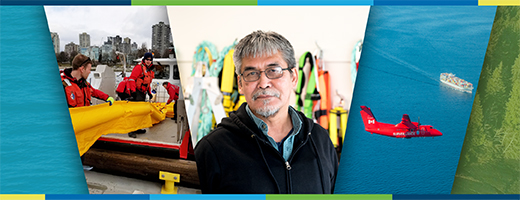In the 1970s, there was a major oil spill in Canada almost every two weeks. By 2017, there have been roughly 1.7 major spills per year in Canada. This large decrease has happened even though more oil than ever is being transported by water, vessels are getting larger and are carrying more oil onboard. Canada's marine safety system has been the difference-maker.
This system must continue to evolve to be as effective at protecting the environment as Canadians expect. As part of the Oceans Protection Plan, we've further improved how Canada responds to marine emergencies. This helps us protect our coasts and Canadians at sea.

Most requested
Contributors
Actions being taken
Developing equipment capacity standards for oil spill preparedness
Proposing an equipment capacity standard and technical guidance for draft regulations updating the oil spill preparedness requirements for Transport Canada-certified response organizations and oil handling facility operators.
Expanding liability and compensation for marine incidents
Ensuring that the polluter pays when there is a marine spill in Canadian waters.
Renewing the Canadian Coast Guard Auxiliary
Increasing funding for the Canadian Coast Guard Auxiliary, a network of non-profit organizations that expand on-water response capacity.
Improving Canada's response to hazardous and noxious substances
Preventing and preparing response to marine spills involving goods other than oil.
Expanding Canada’s communication portal for integrated incident response
Modernizing how the Canadian Coast Guard collaborates with coastal communities and shares information about Canada's waterways.
Increasing scientific support to respond to environmental emergencies
Delivering timely expert scientific and technical advice and increasing enforcement capacity during environmental emergencies.
Enhancing Canada’s Arctic Marine Response Station
Extending Canadian Coast Guard search and rescue services in the North by purchasing purpose-built vessels and expanding the operational season to better align with community activities.
Analyzing risk of maritime search and rescue delivery
The Canadian Coast Guard’s Risk-Based Analysis of Maritime Search and Rescue Delivery is a process to identify, assess, and address risks in search and rescue areas.
Developing Canada’s strategy for environmental recovery from oil spills
Guiding long-term recovery efforts following ship-source oil spills.
Preparing for and responding to marine pollution
Preparing for and being ready to respond to all types of marine pollution.
Creating a national oil spill research program
Expanding oil research and spill response science by creating a consolidated national oil spill research program.
Launching a Heiltsuk Marine Emergency Response Team
Establishing the Heiltsuk Marine Emergency Response Team as a third-party responder in Canada’s marine preparedness and response system.
Acquiring pollution response vessels
Purchasing new pollution response vessels to help respond to oil spills.
Multi-Partner Research
Increasing knowledge about the impact of spills on organisms, develop new technologies and protocols for clean-up, and support science-based decisions that minimize impacts to the environment and habitat recovery.
Establishing a National Integrated Marine Response Planning Program
Developing a new national program for marine spill response planning.
Establishing coastal marine response teams
Coastal Marine Response Teams will enhance coordination of first responders during marine incidents.
Enhancing marine emergency management
Strengthening the laws, regulations, and policies for managing marine incidents.
Strengthening Oil Spill Response and Environmental Protection: Alternative Response Measures
Access to a broad range of response tools for oil spills.
Improving drift prediction and near-shore modelling
Developing high-resolution models of ocean conditions in additional key Canadian ports and areas of concern.
Improving environmental response community caches in the Arctic
Improving preparedness to respond to oil spills in the Arctic by setting up community environmental response equipment supply in more communities that are at a higher risk of oil spills
Improving Canada’s marine emergency towing capacity
Increasing Canada’s emergency towing capacity to rescue vessels in distress and avoid potential marine incidents.
Increasing scientific support to respond to environmental emergencies
Delivering timely expert scientific and technical advice and increasing enforcement capacity during environmental emergencies.